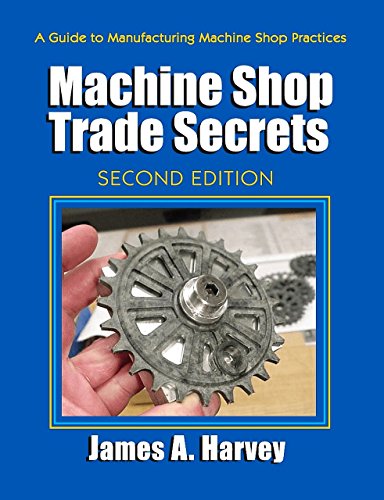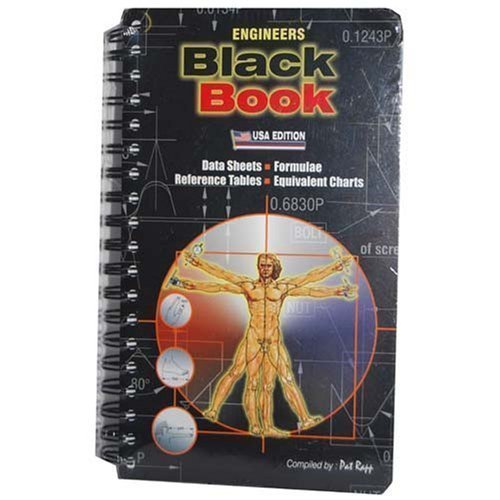(Part 3) Top products from r/Machinists
We found 22 product mentions on r/Machinists. We ranked the 296 resulting products by number of redditors who mentioned them. Here are the products ranked 41-60. You can also go back to the previous section.
41. Machinery's Handbook 26: A Reference Book for the Mechanical Engineer, Designer, Manufacturing Engineer, Draftsman, Toolmaker, and Machinist
Sentiment score: 0
Number of reviews: 1
 Show Reddit reviews
Show Reddit reviews42. Machinery's Handbook Collector's Edition: 1914 First Edition Replica
Sentiment score: 0
Number of reviews: 1
 Show Reddit reviews
Show Reddit reviews43. Metalworking: Doing It Better (Volume 1)
Sentiment score: 1
Number of reviews: 1
 Show Reddit reviews
Show Reddit reviews44. Machine Shop Trade Secrets
Sentiment score: 1
Number of reviews: 1
Used Book in Good Condition
 Show Reddit reviews
Show Reddit reviews45. Making Small Workshop Tools (Workshop Practice)
Sentiment score: 1
Number of reviews: 1
NewMint ConditionDispatch same day for order received before 12 noonGuaranteed packagingNo quibbles returns
 Show Reddit reviews
Show Reddit reviews46. Machine Shop Practice, Vol. 1
Sentiment score: 1
Number of reviews: 1
Used Book in Good Condition
 Show Reddit reviews
Show Reddit reviews47. Engineers Black Book (Data Sheets, Formulae, Reference Tables, Equivalent Charts)
Sentiment score: 0
Number of reviews: 1
Machinist Reference BookData Sheets, Formulae, Reference Tables, Equivalent Charts
 Show Reddit reviews
Show Reddit reviews49. Fundamentals of Geometric Dimensioning and Tolerancing
Sentiment score: 1
Number of reviews: 1
Cengage Learning
 Show Reddit reviews
Show Reddit reviews50. Metal Cutting Theory and Practice (Manufacturing Engineering And Materials Processing)
Sentiment score: 0
Number of reviews: 1
 Show Reddit reviews
Show Reddit reviews51. Stanley 33-425 25-Foot by 1-Inch Measuring Tape
Sentiment score: 0
Number of reviews: 1
16-Inch and 19.2-Inch stud center markings7-Foot standout25-Foot length1-Inch width
 Show Reddit reviews
Show Reddit reviews52. A Guide to Renovating the South Bend Lathe Models 10L 13 14-1/2 16
Sentiment score: 0
Number of reviews: 1
 Show Reddit reviews
Show Reddit reviews53. Useful Machine Shop Tools to Make for Home Shop Machinists (Fox Chapel Publishing) 15 Simple, Useful Additions to Your Workshop Equipment, from a Micrometer Stand to a Self-Releasing Mandrel Handle
Sentiment score: 0
Number of reviews: 1
 Show Reddit reviews
Show Reddit reviews55. Studies in the History of Machine Tools
Sentiment score: 1
Number of reviews: 1
 Show Reddit reviews
Show Reddit reviews56. Geo-Metrics III: The Application of Geometric Dimensioning and Tolerancing Techniques (Using the Customary Inch Systems) (Vol 1)
Sentiment score: 0
Number of reviews: 1
 Show Reddit reviews
Show Reddit reviews57. RGB LED Flood Lights, 100W Color Changing Outdoor Floodlight with Remote Control, 16 Colors 4 Modes Dimmable Security Light, IP65 Waterproof Wall Washer Light for Outdoor Decorative Garden Stage Ligh
Sentiment score: 0
Number of reviews: 1
✔ 【16 Colors & 4 Modes】 Red, Green, Blue, and White. total 16 different colors , and 4 selection modes(flash/strobe/fade/smooth).you can adjust the color through the remote control.✔ 【Super Bright】 100W RGB LED Flood Light, 10000Lumens, 120 ° Reflector.144Pcs * 2835 SMDs. High brightnes...
 Show Reddit reviews
Show Reddit reviews




I would first like to say that I agree with everyone else here who recommends buying a used one and restoring it (or just keeping looking for a good deal, they're out there).
​
That being said, there is a series of books available by David Gingery that has instructions on how to build basic metalworking machines from scrap. The first book in the series builds a foundry that enables you to cast aluminum, the second book builds a lathe, third a shaper, fourth a milling machine, etc. Seven books in total I think.
​
If you do look into going this route, I'd strongly recommend looking into some of the more modern forms of sand casting, specifically the "lost foam" method which seems to be a lot easier to get consistent results from.
​
Additionally, there are quite a few youtube series that build lathes either directly from Gingery's designs, or inspired by them. I was introduced to Gingery via the Makercise series and he, if I remember correctly, mostly follows Gingery's designs (he also covers lost foam casting as well)
​
Note: if this series seems interesting to you, it would be cheaper to buy the hardcover book containing the whole series (or all 7 individual softcover books as a set) than it would be to buy each individually. However, if all you care about is the lathe, then just the first two should be enough to get you started (and you can always pick up the others later if you find yourself still interested in proceeding)
There is one piece of wisdom regarding small mills that I see again and again: the first thing to look at is machine weight. Mass = rigidity. Rigidity is the basis for many virtues - primarily clean cuts and accuracy. Rigidity also equates to long tool life.
You will encounter lots of people telling you to buy an old knee mill (e.g. Bridgeport). I can say from experience that a worn-out Bridgeport is next to useless. We had one at my previous day-job that was horrible - everything chattered, tools broke, parts were out of spec, etc.
Of course, the ways on an old mill can be restored - but my point is that buying an old mill is not a guaranteed road to success.
It is said that a good machinist can make good parts on a bad machine. Take a look at Sherline mills and the online resources/community. I'm not endorsing the Sherlines, but they are a great example of a baby machine that can make good parts with the right techniques. I do highly recommend the book written by the late owner.
If all you want to do is slotting and light side milling, a little mill might be fine. When you get into face milling and heavy cutting - that is when you want a big beefy machine. The Taig mill is another micro machine similar to the Sherline.
I learned a lot from a guy on YouTube, mrpete222. He’s got some good how-to videos and I’m sure there are many other good channels. This book: Machine Shop Trade Secrets https://www.amazon.com/dp/0831134771/ref=cm_sw_r_cp_api_i_kwZxCb75W3RY8 is good to have around the shop too.
Also try building one of these: http://www.john-tom.com/html/SteamPlans.html
Some of them will force you to think outside the box and or use methods you don’t commonly use. They’re nice practice pieces that you’ll keep for a long time :) good luck!
Precision Engineering: An Evolutionary View is a great book (though hard to find.) It doesn't so much focus explicitly on machining but talks about the developments such as accurate screws and surfaces and other milestones that are required for machine tools along with specific cutting edge machine tools like the LODTM. It does a good high level of what I mentioned, but purposefully doesn't go into crazy detail on any one point or idea and includes an extensive source list if you want to go further down the rabbit hole.
I and others answered a somewhat related question here (and I posted a ton of books that may be of interest to you like the Cope book someone else mentioned here.)
Edit: Here are a few specific sources from that list:
History of Machine Tools, 1700-1910 by Steeds
Studies in the History of Machine Tools by Woodbury
A History of Machine Tools by Bradley
Tools for the Job: A History of Machine Tools to 1950 by The Science Museum
A History of Engineering Metrology by Hume
Sounds like you need to hit the internet hard or pickup some books on print reading because man, if you're taking CNC classes and can't read a print, you're in over your head. My trade school required manual machining and print reading before being allowed to progress into programming and CNC machining.
Print reading is fundamental and if you can't read a print well, you can't program and you can't decide what strategies to apply to your process. You'll end up an operator without it.
Theres also several different ways tolerance prints, GD&T seems to what everyone is moving to. That being said, about half the prints I get are ASME and the others are GD&T.
You'll have to find out what system is going to be used in your classes and go from there to decide exactly what you need to learn for your education. For GD&T I used: http://amzn.to/2tiWi8T and it was okay but not great. ASME was included in another textbook I had at the time.
Good luck man, print reading is absolutely critical to being successful in this trade and most shops won't look at you twice if you can't read a print.
Edit: Forgot to add to brush up on your trigonometry.
I recommend Machine Shop Practice Vol. 1 & 2 to get a sense of the machinist's trade. You will have no idea what half the stuff in the book means until you've spent a few months on a conventional lathe or mill, but the reference will be extremely helpful as you progress. There's next to nothing about CNC work in there, unfortunately, but it's one of the best general references I know for this work.
Make tools.
Here are a couple of books on the subject that are suitable for a beginner.
https://www.amazon.com/Making-Small-Workshop-Tools-Practice/dp/0852428863
https://www.amazon.com/Useful-Workshop-Tools-Practice-31/dp/1854861948
The projects in these books range from basic lathe and mill work thru making a filing machine.
I warn you, these aren't going to hold you hand with step by step directions. Many of the plans don't even have measurements. As a hobbyist I find them challenging. Since you are being formally trained, you'll probably find them much easier. So push yourself to maintain much tighter tolerances then you actually need.
***
The wife asked, "What are you doing?"
I answered, "Making a washer using this boring bar."
She responded, "Why? It would take less time to buy one from the store. Or at least drill it to roughly the right size and move on."
I thought about it for awhile, then I remembered why I do this. Because it's a lot better to learn how to bore accurately on a 25 cent washer than it is to learn on a 75 dollar casting.
If you watch one guy long enough you'll start picking up the lingo yourself. Tom Lipton is where I started and I think he and Abom are really the most helpful talking about stuff for setups, basic milling/lathe technique, etc. Tom also wrote a book that's a great read to get started with all kinds of this work.
EDIT - FYI I'm now a full-time hobbyist and part-time odd job shop with mill and lathe at home.
Engineers Black Book (Data Sheets, Formulae, Reference Tables, Equivalent Charts) https://www.amazon.com/dp/0958057125/ref=cm_sw_r_cp_api_RIKNyb5VTCP7B
Its quite helpful for this sort of things
Does Amazon have any used copies available?
EDIT: If 7th edition would work for you (current edition seems to be 10th), Amazon has used copies starting at $9.42
https://www.amazon.com/gp/offer-listing/0130334472/ref=dp_olp_all_mbc?ie=UTF8&condition=all
http://www.amazon.com/Geo-Metrics-III-Application-Dimensioning-Tolerancing/dp/0201633426
I guess there are others, but I was under the impression this was the "Bible." Maybe that belief stems from one source though.
Those are nice but this is a far more accurate caliper
https://www.amazon.com/gp/aw/d/B00002X2GQ/ref=mp_s_a_1_3?ie=UTF8&qid=1495863708&sr=8-3&pi=AC_SX236_SY340_FMwebp_QL65&keywords=tape+measure&dpPl=1&dpID=41RWEfPSKQL&ref=plSrch
It's used for precision inspection by real machinists!
I have the same lathe, same age. In the process of tearing apart, replacing worn out parts, re-felting and repainting.
Get the Ilion guide to renovating the lathe, and even if you don't plan on doing that, the pictures and instructions will clear up how everything should work, and how it looked when new.
http://www.amazon.com/dp/1482334585/ref=cm_sw_r_tw_awdo_rfRlxb1AKQYGW
you can get a reproduction 1st edition online if you want...
https://www.amazon.com/gp/offer-listing/0831126353/ref=dp_olp_used?ie=UTF8&condition=used
you will probably find more information here for less..
https://www.biblio.com/book/handbook-gear-design-second-edition-gitin/d/436272548?aid=frg&utm_source=google&utm_medium=product&utm_campaign=feed-details
An excerpt from this book Atomic Accidents: A History of Nuclear Meltdowns and Disasters: From the Ozark Mountains to Fukushima...absolutely fascinating!!!